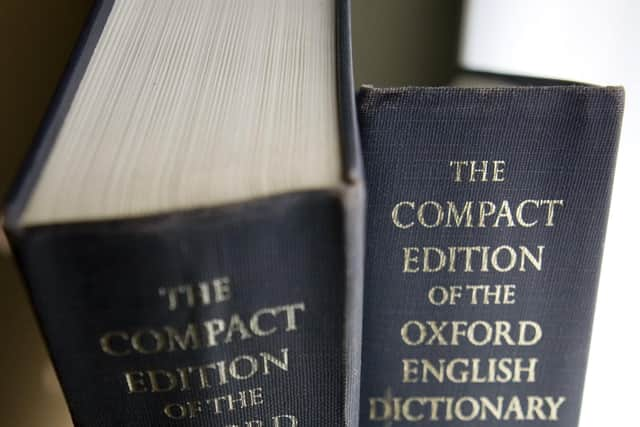'Goblin mode' as word of the year? If you don't like it, there's a new word added to English every 98 minutes – Martyn McLaughlin
Perhaps pristine is overstating it: the margins of the modest booklet feature the odd indecipherable scrawl by some long-suffering sub-editor. On one page devoted to recent naval appointments, meanwhile, there is a small stain which, to my expert eye, bears more than a passing resemblance to the dark, ruby-red hue of Guinness.
For someone immersed in the ink trade, stumbling across such a tangible link to its past – especially one that is part of this newspaper’s heritage – was a wonderful surprise. Since that chance discovery, the small tome, updated over the years by generations of esteemed journalists such as Ronnie Munro, has had pride of place in the pile of reference books that teeters on my desk.
Advertisement
Hide AdAdvertisement
Hide AdThe truth, of course, is that I seldom have occasion to reach for it. Many of the entries in its lists of commonly used words are firmly of their time, and have long become redundant. Some are quaint curiosities, such as “cyclecar” or “dogcart”, that have been swept aside by the tides of technological progress. Others, like “hallboy”, and “manservant”, have thankfully fallen by the wayside as Scotland continues its journey to become a more equitable place.


But these words are a part of history. They are a snapshot of a moment in this country’s past, as well as the way in which this newspaper has strived to chronicle them. This week, I’m pleased to say the old style book has been front and centre of my desk, if only to remind me of how such linguistic relics were once ubiquitous.
With 2022 rushing to a close, lexicographers the world over have announced their words of the year, a relatively recent accolade almost always guaranteed to spark debate and derision. The trend began in Germany, where back in 1971, the Gesellschaft für deutsche Sprache language society announced “aufmüpfig” as its inaugural word of the year. The term, roughly translated as rebellious, or subordinate, sought to capture the counterculture mood.
The idea took time to catch on in the English language, with the American Dialect Society the first to pick up the baton in 1990. Its maiden entry, “bushlips”, referenced the then US president, George HW Bush, and his broken election promise not to raise taxes. It also had the advantage of being a particularly racy homophone.
My own personal favourite from the entries over the years is “willkommenskultur”, a splendid German portmanteau which translates as “welcome culture”. It was chosen in 2015 to not only signify the warm attitude shown to migrants and refugees, but to actively encourage it. Such is the power of language.
Unfortunately, such delightful neologisms are increasingly the exception, rather than the rule. An array of dictionary publishers and linguistic societies around the world now announce their own words of the year, but the vast majority grasp for the zeitgeist, only to fall short.
This year is a case in point. The Oxford word of the year is ‘goblin mode’, a slang term describing self-indulgent or slovenly behaviour. There are two problems here. The first is that it comprises two words, not one. The second is that the term is hardly used outside of Twitter and Reddit. As soon as those platforms wither and die – hello, Elon Musk – they will be left to languish alongside all those rusted cyclecars and dogcarts.
A cursory look through past Oxford entries throws up other examples. “Bovvered”, crowned word of the year in 2006, has long sprouted daisies in the graveyard of television catchphrases, while “Big Society”, lauded just four years later in the first flush of David Cameron’s premiership, remains as vacuous and inconsequential as it was in 2010. The nadir, however was “simples”, chosen as the Oxford word of the year in 2009, and which spoke only to the ubiquity of an advertising campaign for a certain price comparison site.
Advertisement
Hide AdAdvertisement
Hide AdThen again, maybe hindsight has made me too harsh a judge. Maybe the point – the only point – of these words is to capture a moment in time, no matter how fleeting. For its part, Oxford University Press, which publishes the Oxford English Dictionary, says the award is designed to “reflect the ethos, mood, or preoccupations” of the past 12 months, and to showcase a word “that has potential as a term of lasting cultural significance”.
A sound basis, for sure, and some of its words of the year in recent times – “climate emergency”, “post-truth”, and “omnishambles” – will prosper for longer than most. But then again, Oxford also took the decision to partner with the smartphone app firm, SwiftKey, when announcing an emoji as the word of the year back in 2015 – plentiful ammunition for those lexicographers who regard the whole thing as a thinly disguised marketing wheeze.
For what it’s worth, I’m inclined to agree with that viewpoint, although I don’t necessarily think it’s problematic. Any initiative which encourages people to purchase a decent dictionary is to be welcomed.
According to the Global Language Monitor, there are now upwards of 1,005,300 words in the English tongue, with a neologism being coined every 98 minutes. It is not a monolithic language. It is a smorgasbord of dialects found across the world, each one informed by a unique combination of geography and culture, and each one constantly morphing and evolving.
We shouldn’t be daunted by this. We should be excited by it. The linguist, David Crystal, has estimated that the average university graduate knows between 50,000 and 75,000 words. All of us have room for improvement. There are new words out there, waiting to be discovered. And if ‘goblin mode’ isn’t for you, another one will be along in a minute.
Comments
Want to join the conversation? Please or to comment on this article.